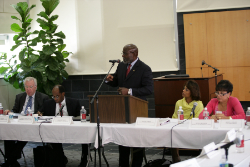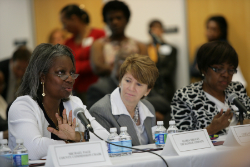NCCU Round Table Focuses on Job Creation
 Members of President Barack Obama’s Council on Jobs and Competitiveness came to North Carolina Central University on Monday morning seeking ideas and suggestions from local leaders about how to accelerate job growth and economic development. And they did not leave empty-handed.
Members of President Barack Obama’s Council on Jobs and Competitiveness came to North Carolina Central University on Monday morning seeking ideas and suggestions from local leaders about how to accelerate job growth and economic development. And they did not leave empty-handed.
In a spirited 90-minute round-table discussion, representatives of Research Triangle businesses, nonprofits, governments and educational institutions offered their views about policies and strategies that promote job creation, and about those that impede it.
The session at NCCU was one of five similar gatherings in the region held in conjunction with Obama’s visit to Durham later in the day, which included a speech at Cree, the LED lighting manufacturer.
Session moderator Melody Barnes, a White House domestic policy advisor, said the national job picture is slowly improving, “but we started from such a deep hole.” North Carolina was chosen as the site for Monday’s meetings “because of what you’re doing,” she said. The Research Triangle is notable for its “dramatic focus on innovation” and for its collaborations between the public and private sectors, she said, adding, “We want to take those lessons to the rest of the country for job-creation purposes.”
Many of the speakers at the NCCU session praised the local business climate. Among them was Cheznee Johnson, a communications manager at Merck & Co., which operates a vaccine manufacturing plant in Durham. “We’ve expanded four times” since the plant opened in 2004, she said, adding that the plant is adding 130 jobs this year, bringing the workforce to 750. The attractions of the location, she said, are three: the quality of the labor pool, thanks to the training provided institutions such as NCCU, Durham Tech and N.C. State University; the incentives offered by the state, and the “quality of life.” “North Carolina is great for biotechnology,” she said.
 DeLisa Alexander, an executive at Red Hat, the Raleigh-based software company, said, “Our competitive advantage is our workforce.” She praised the quality of the workers educated at local universities and community colleges, but said the company was nonetheless contending with a “talent squeeze.” “We need more individuals skilled in the technologies of the future,” she said. It is vital, she said, to get more people into the technology pipeline by reaching out to elementary and middle schools to interest children in careers in science and technology.
DeLisa Alexander, an executive at Red Hat, the Raleigh-based software company, said, “Our competitive advantage is our workforce.” She praised the quality of the workers educated at local universities and community colleges, but said the company was nonetheless contending with a “talent squeeze.” “We need more individuals skilled in the technologies of the future,” she said. It is vital, she said, to get more people into the technology pipeline by reaching out to elementary and middle schools to interest children in careers in science and technology.
Casey Steinbacher, president and CEO of the Greater Durham Chamber of Commerce, described her organization’s efforts to encourage companies to start or expand businesses in Durham. The chamber has focused on establishing “peer networks” among entrepreneurs to enhance the region’s entrepreneurial climate. “Job growth comes from smaller companies,” she said. “We try to attract smart people who want to start their own business.”
Other speakers touched on a range of topics, including:
- The need to improve access to government and commercial contracts for small businesses, particularly those owned by women and minorities.
- The need to expand the availability of affordable child care, so that women — who now earn the majority of baccalaureate and graduate degrees — can have easier access to the job market.
- Obstacles faced by Hispanic immigrants in gaining access to education and job training.
Glenn Adams, a Fayetteville lawyer and chairman of the NCCU Board of Trustees, was one of several speakers who pointed out that reductions in federal Pell Grants and other financial aid to students have had the effect of stifling entrepreneurship and job creation. “Students who graduate from college with heavy debts need jobs right away,” he said. “You can’t be an entrepreneur who’s creating jobs if you need to repay your loans.”

